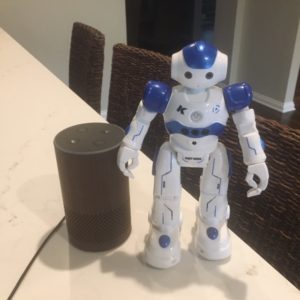My family has six members, according to my four-year-old son: mommy, daddy, sister, brother, our fish and “Blexa.” “Blexa” is how he says “Alexa,” the voice service associated with our Amazon Echo device.
Not only does he talk about Alexa as if she’s a person, he says Alexa is going to marry the toy robot he asked for (and received) for Hanukkah (see the future couple below). And “Alexa is Christmas” not Jewish, he and his older sister say, since our questions about the origins of the Jewish New Year stumped Alexa a while back.

The future couple
My little guy is not alone in anthropomorphizing Alexa. An MIT study found younger children try to understand Alexa and similar technologies as if the devices were a person, asking them their age or favorite color. It’s also easy to find news articles written by other parents in recent years whose children have exhibited similar behavior as my son (with “Alexa” even among some kids’ first few words). And more parents will probably soon experience the same, as the technology becomes more widespread this holiday season.
I’ve been wondering whether I should be doing something about my son’s perception of Alexa, besides leaving our Echo unplugged and out of reach when we’re not using it and supervising my children when they give their commands. Based on a quick unscientific look at various publications, studies and articles out there on the subject, it seems I can be doing more.
Today’s hint is a quick take on what I’ve discovered regarding how we may want to talk to our little kids about Alexa and similar technologies. The gist: We should explain to our kids that smart speakers and digital assistants are not people and do not have feelings, and instead are machines and tools, like a computer, phone or watch. And if you want to go into more detail, it may help to do some brushing up yourself on how the technology works (this CNET piece can help), so you can explain it better.
Seems like obvious advice, right? It is, but it’s an important tip too. It’s easy to get so caught up in the cuteness of our little ones’ interactions with the technologies, that we skip doing proper explaining, possibly to our children’s detriment. The jury is still out on what the long-term implications of growing up with such technologies will be for our kids, with some experts raising concerns about what use of digital assistants like Alexa will mean for their development (say, of empathy or even of basic manners).
In the meantime, teaching our young children the difference between a person and a useful tool seems like a simple way to start preparing them for a world where such technologies may be ubiquitous. And finally, while you’re preparing for your how-Alexa-works conversation, here’s a fun roundup of kid-friendly Alexa skills and commands, and a parental control explainer, I came across on the site “the ambient”.
How have you talked to your little ones about these new technologies? What’s your top Alexa-related hint?
Follow Hint Mama on Facebook and Twitter, and read more about her and her disclosures.






